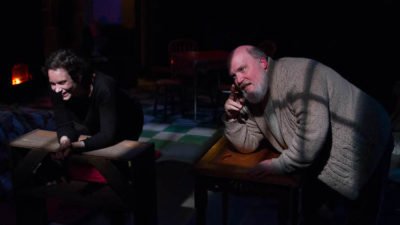The Night Season by Strawdog Theatre
By Rebecca Lenkiewicz.
Directed by Elly Green.
Produced by Strawdog Theatre Company.
Playing at The Factory Theater, Chicago.
The Charm of the Irish; or 150 Minutes of Sitting Still.

To conclude their 29th Season and their last show at The Factory Theater, Strawdog is currently staging Rebecca Lenkiewicz’s The Night Season. An ensemble play I would describe as more about loneliness than love, The Night Season is an experiential success insofar as it offers the same disappointment of loneliness by not only conveying loneliness’s disappointment through its characters but also by leaving its audience disappointed at its end—all this despite its sentimental conclusion in which many characters actually find love. In short, the play starts off strong, with an interesting premise and characters, then quickly ignores its premise to stagnate for two hours without any substantial character development, until the final scene when we learn that the characters have miraculously matured and the play we thought was going to be an emotional feast has turned out to be no more than a mundane representation of the experience of life.
A dramatic biopic on W.B. Yeats is being filmed in the coastal town of Sligo, Ireland. John (John Henry Roberts), a British actor, is the lead, and for the six-week shoot he has decided to seek board with the Kennedys. The Kennedys are natives of the town, and their household consists of a maternal grandmother, a father, and three sisters, the mother having abandoned the family some years ago to live in London.

Each of the characters has some love interest. For the eldest sister, Judith (Justine C. Turner), it is Gary (Michael Reyes), a likeable guy who has for a long time been in love with this frustratingly ambivalent sister. For the youngest daughter, Maud (Stella Martin), it is some existential communist fellow we never get to meet. For the father, Patrick (Jamie Vann), it is the busty bartendress from the town pub (whom we also never meet). And for the middle sister, Rose (Michaela Petro), it is John, the handsome actor who’s recently lost his mother. The grandmother, Lily (Janice O’Neill), also falls in love with John, so to speak, but her story is not so much one of love as one of dementia.
In 150 minutes, we learn about these characters and their struggles with love (or loneliness), learn a bit about their histories and their relationships, and then witness a sentimental conclusion to their love stories. The path to this conclusion is winding, beginning with endearing charm, descending into forgettable tangents and love scenes, then crawling to the happy end.
Tender, funny, and sad are three words to describe this production, but a fourth overtakes them all: long. It is very long. Granted, the play takes place over six weeks, but, by the end, it has surely outstayed its welcome.
Besides the diffuse dialogue—poetic and charming but quantitatively and thematically gratuitous—the major upset in this play lies in its characters’ lack of discernable wants and aims. Scene to scene, the story unfolds organically; yet towards the end of the first act, the subtly drawn charms of these colorful characters begins to wear thin and the tension between the characters and the story begins to become tiresomely palpable: these are interesting characters—but why again do I care about them?

Part of the cause is that there are so many stories being told that none of them feels like it gets enough attention. What I took to be the major storyline (or at least the strongest), the love affair between Rose and John, takes up most of the first act, then disappears for the majority of the second, only to pop up here and there in brief exchanges between the two. What’s worse, we never really discover why John begins to distance himself from Rose, or what Rose really thinks about the situation. It just happens, like much in this play.
Moreover, the conflicts, such as the one that precipitates between Rose and John, never actually reach a boiling point on stage, never really get to sizzle with impassioned drama. They merely simmer until they evaporate over the course of time (again, 150 minutes). There may be something laudably Chekhovian in all of this that I am too obtuse or inexperienced to appreciate, but, from my little perspective, the play just seemed to lose focus and become entangled in its many storylines.
The Night Season is charmingly heart-warming and funny in its best moments, and features a very strong cast of actors—notably, Janice O’Neill and John Henry Roberts, both of whom I could easily have imagined receiving Jeff nominations. Lenkiewicz, however, delivers up only disappointment by the end, when the heart has cooled, the charm has worn, and the funny has outstayed its welcome.
Somewhat Recommended.
August Lysy.
Playing at The Factory Theater, 1623 W Howard, Chicago. Tickets are $30. For tickets and information, call 866-811-4111. Performances are Thursdays thru Saturdays at 8:00 p.m., and Sundays at 4:00 p.m. through June 24th (Note: an $18 Industry performance will be held on Monday, June 5th). Running time is 150 minutes including one intermission.

